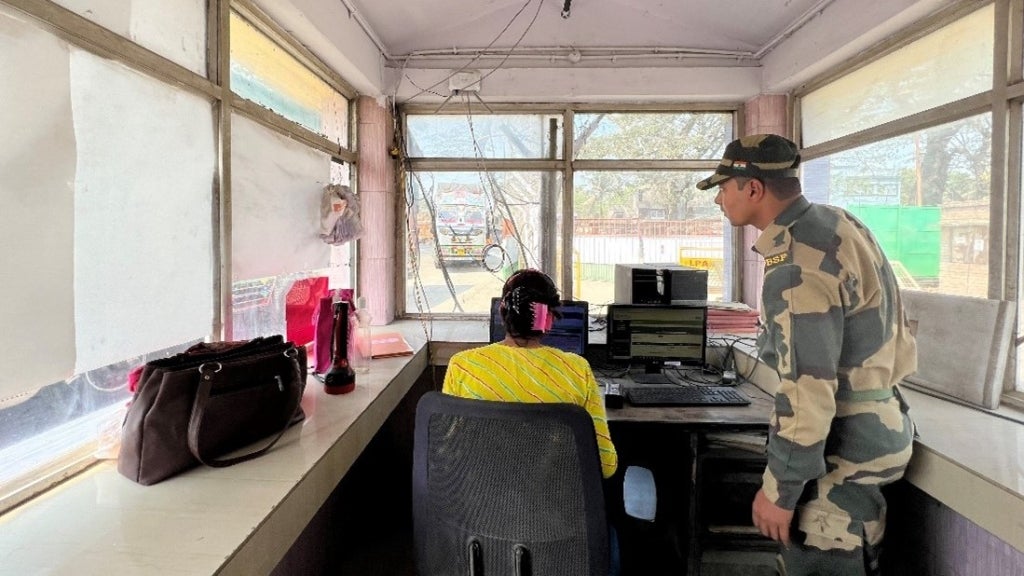
It’s 7 a.m, and Durba takes her position in the data room at the entry gate of the Integrated Check Post (ICP) at Petrapole, West Bengal. A truck carrying export goods from India to Bangladesh arrives, and her computer screen lights up – the automatic reader at the ICP gate has read the license plate and matched the details with those submitted by the exporter online. The Border Security Force (BSF) agent standing next to her does a quick check. And just like that, within 30 seconds, the truck is cleared. Durba opens the boom barrier and lets the truck through to the ICP’s free parking lot for customs checks, before proceeding through to Bangladesh.
The World Bank is supporting the upgrading of cross-border trade facilitation infrastructure in eastern South Asia under the Accelerating Transport and Trade Connectivity (ACCESS) program, with investments worth $1.03 billion in Nepal and Bangladesh. One of these investments is taking place at Benapole, Bangladesh, on the other side of the border with ICP Petrapole, India’s busiest land port.
Petrapole ICP is a “one-stop shop”, housing various facilities within the land port, including customs, immigration, and border security. It handled nearly $3.8 billion worth of trade in 2021-22, with nearly 30% of land-based trade between India and Bangladesh going through it. We expected long queues of trucks lined up on the approach road to the land port, and several more to be waiting their turn for processing at informal parking lots in nearby towns, as previously described by our colleague here.
The Suvidha Portal
What we witnessed could not have been more different from the past. This systemic change was made possible by a simple yet efficient IT system called the Suvidha Portal.
The portal is a local innovation developed by IT professionals at the Government of West Bengal. It’s a web-based vehicle facilitation system that allows exporters to book slots for truck clearance online to pass through the ICPs in that Eastern Indian state. The Government of West Bengal and Land Ports Authority of India (LPAI) mandated that exporters carry an E-Suvidha pass and digitally upload vehicle registration and driver details on the portal. This is saving several hours in truck clearance at the border.
Aptly called “Suvidha”, which means “convenience” in Hindi, the portal has been fully operational since January 2023. And already, the average processing time per truck has reduced from nearly 110 hours to 14 hours!
The portal has brought transparency and greater certainty in export times. Previously, until a truck had physically arrived at Petrapole, it wasn’t part of the queue. In some cases, drivers would have to wait for up to 40 days for their turn, just to enter the ICP. But now, with the online booking facility, they can see parking slot availability and book their preferred slot in advance – so that trucks only arrive at the ICP on the day of their booking. A text message with real-time updates is sent to the exporter at each step along the process. Truck drivers are now able to even make multiple trips in a week.

Partnerships are crucial to success
A key ingredient for the success of this initiative is the commitment and partnership between the Government of West Bengal and the Central Government of India. From data sharing, to parking management, to sharing security related information – the Government of West Bengal, LPAI, Indian Customs, and the Border Security Force (BSF) are working together as one team to deliver on this initiative.
The success of the portal at Petrapole has also meant its quick rollout to other ICPs in West Bengal, including Ghojadhanga, Mahadipur, Hili, Changrabandha and Fulbari. This is an important first step toward more efficient cross-border trade and greater regional integration.
Future plans and challenges
Beyond the Suvidha portal, the Petrapole ICP has plans for capacity expansion. A second cargo gate has been proposed to cater for the rise in trade. A new passenger terminal is also coming up, as the land port gears up to handle between 10,000 – 20,000 passengers daily.
With this expansion in operations, the land port will also need to boost its handling capacity. It will need to hire more personnel, especially women, and create a gender-inclusive workforce at the land port.
A gender-inclusive workforce
Durba and the other women data entry operators (DEOs) controlling the entry and exit of the ICP are part of the 10% of personnel who are women.
Two women data entry operators working at Petrapole, Oishi and Shamishka, shared that they appreciated the job as it paid well, the hours were predictable, and they had support from family, being a stable government job. Shamishka is even happy to commute for 1.5 hours from her residence by local train daily.
Women staff work during the day shift from 7 a.m. to 3 p.m., have access to clean sanitation and rest facilities, and mostly work indoors, in shaded areas. Going forward, LPAI plans to undertake a series of measures to make its facilities safer and more inclusive for women staff, as well as to devise plans for women’s skills training.

On the other side of the border, the planned upgrading of Benapole Land port in Bangladesh under the World Bank’s ACCESS program is designed to enhance port efficiency through the development of a digital border management system, contemporary infrastructure facilities, and simplified and paperless processes. These upgrades have the potential to double the trade at the border, from the current level of 450-500 trucks traveling in the India to Bangladesh direction every day.
Despite these improvements, the cycle of unloading and reloading of freight from Indian to Bangladeshi trucks and vice-versa still continues to slow down trade.
As the two countries proceed with modernizing digital systems, infrastructure, and processes on both sides of the border, enhancing coordination on key policies and regulations will be essential for unlocking efficiencies.
Notably, operationalizing the Motor Vehicles Agreement (MVA) would be a game changer for the region. The agreement was signed between Bangladesh, Bhutan, India, and Nepal back in 2015, but is not yet being enforced. Practically speaking, the effective implementation of the MVA would allow Indian trucks to operate on Bangladeshi roads and Bangladeshi trucks to operate on Indian roads. The trucks would be able to proceed to their final destinations, without having to transload to local trucks at the border – saving both time and costs.
Until then, it is heartening to witness the implementation of innovative best practices such as the Suvidha Portal. The quick and efficient rollout of the new system shows that change is indeed possible… and can often happen faster than you would think!



Join the Conversation